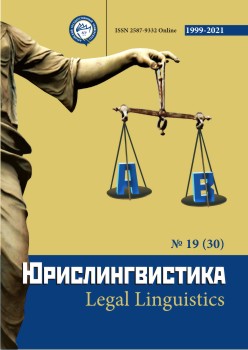Lexicographic Sources as a Tool for a Forensic Examiner
Abstract
The method of lexicographic analysis is actively used in forensic linguistic examination of controversial statements and texts. Law experts interpret words and expressions as the most important argument in the process of procuring evidence. At the same time, when referring to various lexicographic sources, there are discrepancies known in the interpretation of the word meanings, as well as dictionary lables. The work classifies the problems arising in the course of lexicographic analysis of lexemes that occur in disputable texts. To name a few, the problems of the study of words of literary language and non-literary stratums are analyzed, the features of the study of expressive-stylistic coloring of words are described, the necessity to create a specialized dictionary of encyclopedic character to study "extremist" materials is stated.
Downloads
Metrics
References
Апресян Ю.Д., Апресян В.Ю., Богуславская О.Ю., Крылова Т.В., Левонтина И.Б., Урысон Е.В. Новый объяснительный словарь синонимов русского языка. Изд. 2, исправленное и дополненное. Под общим руководством академика Ю.Д. Апресяна. М., 2004.
Варавина Е.В. Первый толковый большой энциклопедический словарь. Спб. – М., 2006.
Гестрин Х. Крайние правые и их символика. [URL: http://www.magenta.nl/misc/sh/index.html]
Изотова Т.М., Кузнецов В.О., Плотникова А.М. Судебная лингвистическая экспертиза по делам об оскорблении. Научно-информационное пособие для экспертов. М., 2016.
Квеселевич Д.И. Большой словарь ненормативной русской лексики. М., 2005.
Кузнецов С.А. Большой толковый словарь русского языка. Спб., 1998.
Кукушкина О.В., Сафонова Ю.А., Секераж Т.Н. Методика проведения судебной психолого-лингвистической экспертизы материалов по делам, связанным с противодействием экстремизму и терроризму. М., 2014.
Кукушкина О.В., Сафонова Ю.А., Секераж Т.Н. Теоретические и методические основы производства судебной психолого-лингвистической экспертизы текстов по делам, связанным с противодействием экстремизму. М., 2011.
Лопатин В.В., Лопатина Л.Е. Толковый словарь современного русского языка. М., 2009.
Мокиенко В.Н., Никитина Т.Г. Русское сквернословие. Краткий, но выразительный словарь. М., 2008.
Национальный корпус русского языка. [URL: www.ruscorpora.ru]
Ожегов С.И., Шведова Н.Ю. Толковый словарь русского языка. М., 1997.
Словарь русского языка: В 4-х т. / РАН, Ин-т лингвистич. исследований; Под ред. А.П. Евгеньевой. — 4-е изд., стер. — М., 1999.
Скляревская Г.Н. Толковый словарь русского языка начала XXI века: актуальная лексика. М., 2007.
Ушаков Д. Н. Большой толковый словарь русского языка. Современная редакция. М., 2014.
Химик В.В. Большой словарь русской разговорной речи. Спб., 2004.
Шмелев Д.Н. Проблемы семантического анализа лексики (на материале русского языка). М., 1984.
References
Apresyan, Yu.D., Apresyan, V.Yu., Boguslavskaya, O.Yu., Krylova, T.V., Levontina, I.B., Uryson, E.V. (2004). New explanatory dictionary of synonyms of the Russian language. Ed. 2, revised and supplemented. Under the general guidance of Academician Yu.D. Apresyan. Moscow (In Russian).
Chimik, V.V. (2004) A large dictionary of Russian colloquial speech. St. Petersburg (In Russian).
Evgenieva, A.P. (1999) Dictionary of the Russian language: In 4 volumes. 4th ed. Moscow. (In Russian).
Izotova, T.M., Kuznetsov, V.O., Plotnikova, A.M. (2016) Forensic linguistic examination in cases of insult. Scientific informational guide for experts. Moscow (In Russian).
Gestrin, H. The extreme right and their symbolism. [URL: http://www.magenta.nl/misc/sh/index.html] (In Russian).
Kveselevich, D.I. (2005) A large dictionary of profanity Russian vocabulary. Moscow (In Russian).
Kuznetsov, S.A. (1998) Great Dictionary of Russian language. St. Petersburg (In Russian).
Kukushkina, O.V., Safonova, Yu.A., Sekerazh, T.N. (2014) Methodology for conducting a forensic psychological and linguistic examination of materials in cases related to countering extremism and terrorism. Moscow (In Russian).
Kukushkina, O.V., Safonova, Yu.A., Sekerazh, T.N. (2011) Theoretical and methodological foundations for the production of a forensic psychological and linguistic examination of texts in cases related to countering extremism. Moscow (In Russian).
Lopatin, V.V., Lopatinа, L.E. (2009) Explanatory dictionary of the modern Russian language. Moscow (In Russian).
Mokienko, V.N., Nikitina, T.G. (2008) Russian foul language. Concise but expressive vocabulary. Moscow (In Russian).
National corpus of the Russian language. [URL: www.ruscorpora.ru] (In Russian).
Ozhegov, S.I., Shvedova, N.Yu. (1997) Explanatory dictionary of the Russian language. Moscow (In Russian).
Sklyarevskaya, G.N. (2007) Explanatory dictionary of the Russian language at the beginning of the XXI century: actual vocabulary. Moscow (In Russian).
Shmelev, D.N. (1984) Problems of semantic analysis of vocabulary (based on the Russian language). Moscow (In Russian).
Ushakov, D.N. (2014) Big Explanatory Dictionary of the Russian Language. Modern edition. Moscow. (In Russian).
Varavina, E.V. (2006) The first explanatory large encyclopedic dictionary. St. Petersburg (In Russian).
Copyright (c) 2021 Светлана Доронина

This work is licensed under a Creative Commons Attribution 4.0 International License.
The authors, which are published in this journal, agree to the following conditions:
1. Authors retain the copyright to the work and transfer to the journal the right of the first publication along with the work, at the same time licensing it under the terms of the Creative Commons Attribution License, which allows others to distribute this work with the obligatory indication of the authorship of this work and a link to the original publication in this journal .
2. The authors retain the right to enter into separate, additional contractual agreements for the non-exclusive distribution of the version of the work published by this journal (for example, to place it in the university depository or to publish it in a book), with reference to the original publication in this journal.
3. Authors are allowed to post their work on the Internet (for example, in a university repository or on their personal website) before and during the review process of this journal, as this may lead to a productive discussion, as well as more links to this published work (See The Effect of Open Access).











